DOWN, NOT OUT
Social distancing takes its toll on food producers, caterers and markets
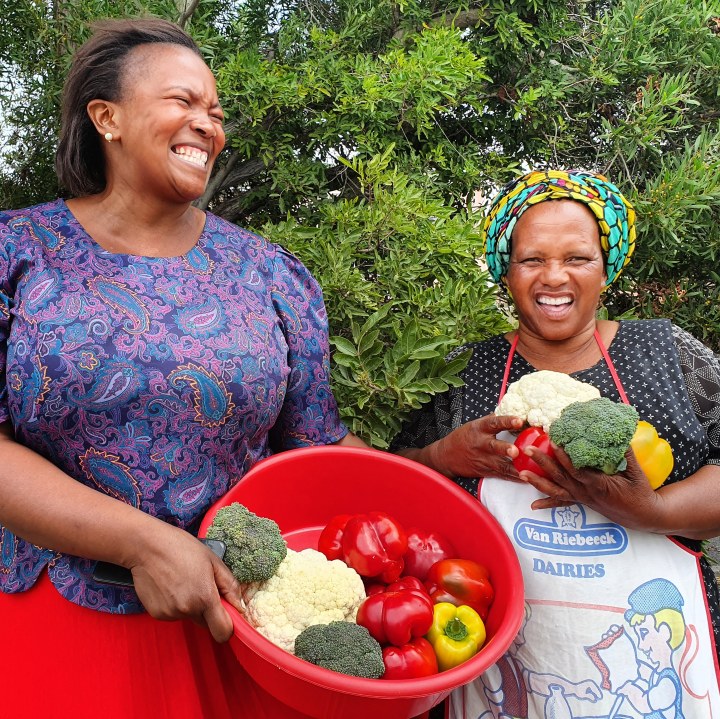
Imagine you’re a professional caterer. This week you had bookings to feed 500 people on one day, and 850 on another. You’ve prepared, ordered and paid. And boom! ... it’s all gone.
Farmers, food markets, small producers and caterers are feeling the sudden massive fallout of business but are coming up with alternative forms of revenue at warp speed. People in the food business are scrappy and resilient, but the coronavirus is something else, like nothing anyone’s ever faced before.
Hear caterer Andrea Foulkes, of Cape Town-based Dish Food & Social:
“The thing was, last week, I was laying awake every single night, freaking out and stressing about how we were going to get through all the work, how we were going to deliver to our clients,” Andrea says. Now? I’m holding back the tears as she tells me about this past week, which was supposed to include serving 500 people in the Absa Hospitality tent with breakfast and lunch for eight days on the road with the Cape Epic; and lunch for 850 at the inauguration of the new Chancellor at UCT.
By March 12, the tents were up at UCT, the kitchens were busy prepping, every plate, cup, fork and knife was on site, as well as kilos of meat and cooldrinks. Dish’s truck was loaded and ready to go to Ceres for the Epic. Then the bottom fell out.
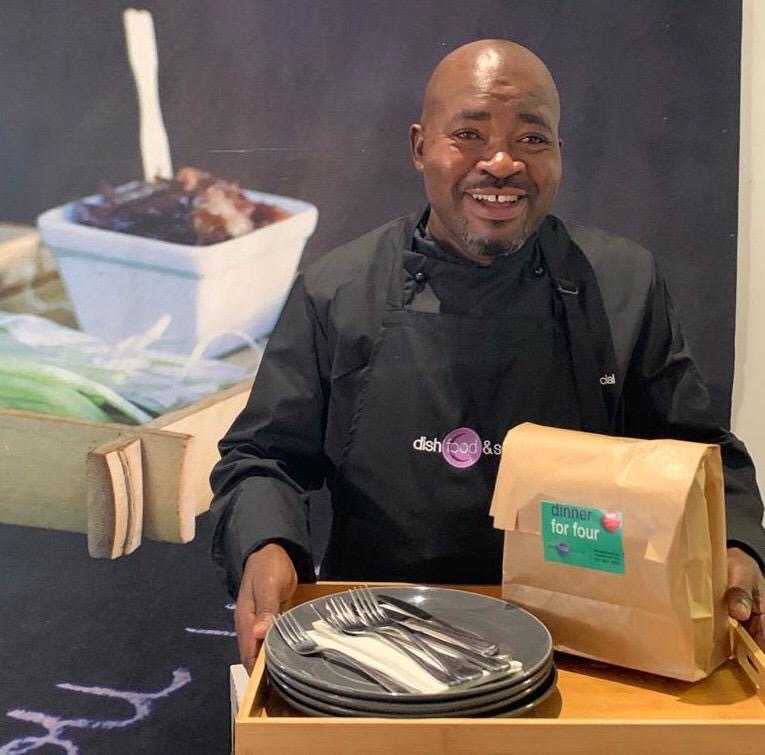
Ayanda Klaas is a chef at Dish Food & Social. Photo: Supplied
UCT cancelled its event on March 13, as chairs were being put into place, carpets laid down and food in the kitchen prepped. At that point, Foulkes went to shul on Friday night for a friend’s daughter’s bat mitzvah. When she came out, she discovered that the Cape Epic had been cancelled. And the cancellations kept coming in… for weddings, corporate functions, awards ceremonies, even a charity ball in July. “By the end of the weekend, there were no jobs,” she says.
The hardest thing was the previous week’s anticipation of Covid-19’s impact on South Africa. “It’s like you know there’s this train coming down the track. You’re not sure if it’s going to hit you, or miss you, or when it’s coming. This was all happening in the back of my head, but in the catering business, you can’t stop prepping… you can’t rock up on the day and say ‘sorry, I thought you’d cancel’. The kinds of numbers we do, you can’t not be prepared,” laments Foulkes, who went from worrying about pulling off the week’s catering jobs to how to keep her 60 or so full-time employees, each with at least half a dozen dependents, on salary.
“So we went back to what we know,” said Foulkes, who expanded the company’s long-standing Tuesday specials of prepared meals for four people to five days a week and is offering delivery pretty much anywhere in Cape Town. “Whoever can drive is delivering,” she adds, as she works to keep her staff employed. Orders can be placed online, by phone at 021 447 0323 or by email, [email protected] or [email protected].
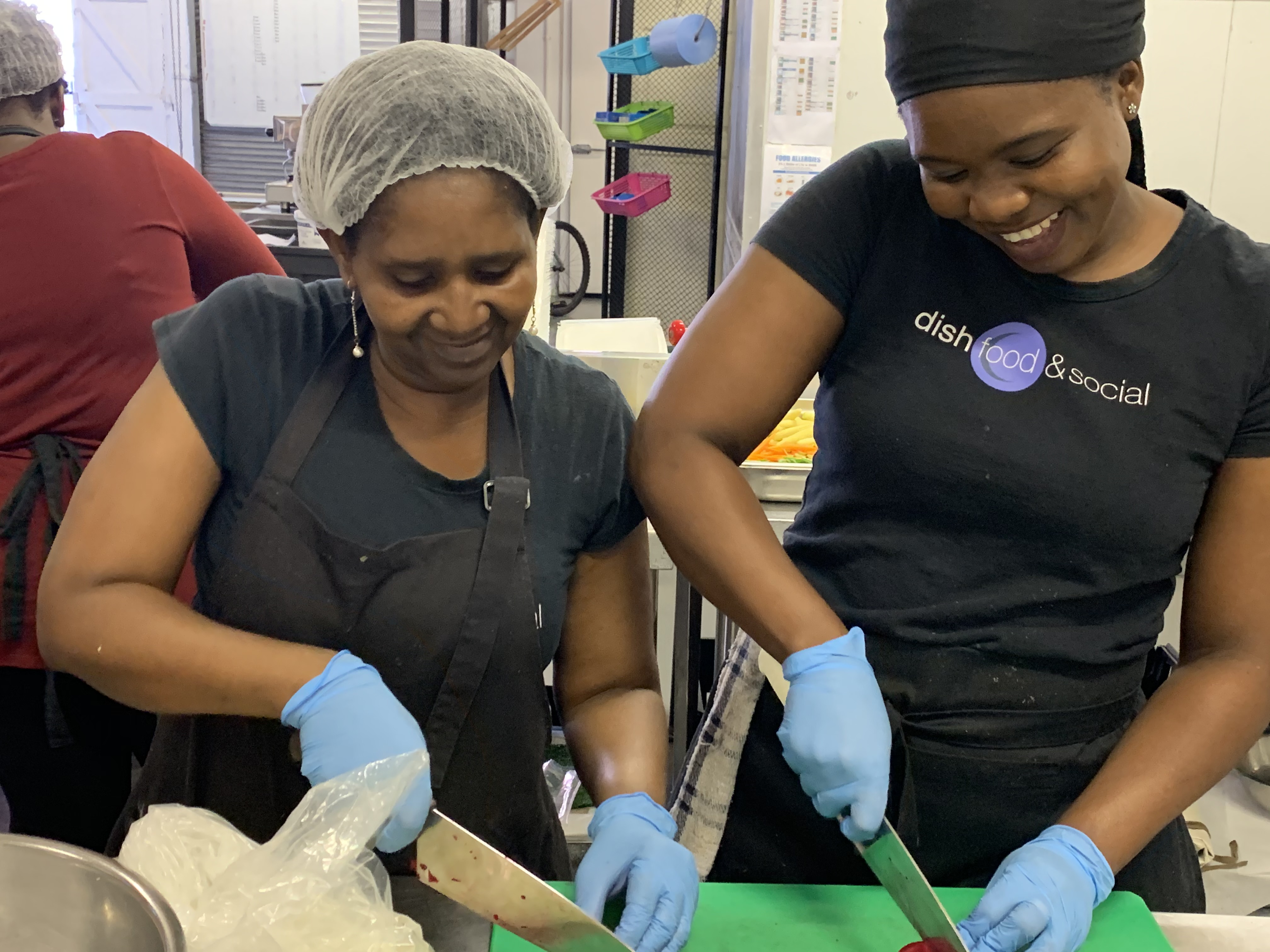
Nomkitha Tini and Somi Marawu of Dish Food & Social. Photo: Supplied
Cape Winelands based catering company Slippery Spoon Kitchen, which normally does at least three weddings a weekend along with countless other events across the Western Cape, also suffered heavy losses, watching all their bookings for the rest of March, April and May fall away this week.
“Even brides who tried to insist that we still cater their weddings found it impossible, with all of our outsourced providers pulling out as well for health and hygiene reasons,” explains Marius Uys.
To make matters worse, Uys and partner Johnny Hamman temporarily closed their restaurant, Hamm & Uys Eatery at Blaauwklippen, although they are confident that the bans will be lifted and they will be able to reopen soon. “It’s been really rough, says Uys. “We’re now facing a six-month winter.”
To soften the blow, Slippery Spoon Kitchen is offering a selection of prepared meals, from ready-to-eat to luxury frozen along with fresh sides and kid-friendly foods, with delivery across the Winelands and Cape Town. To order, call or Whatsapp 076 790 4789.
OZCF Market Closure and Recovery
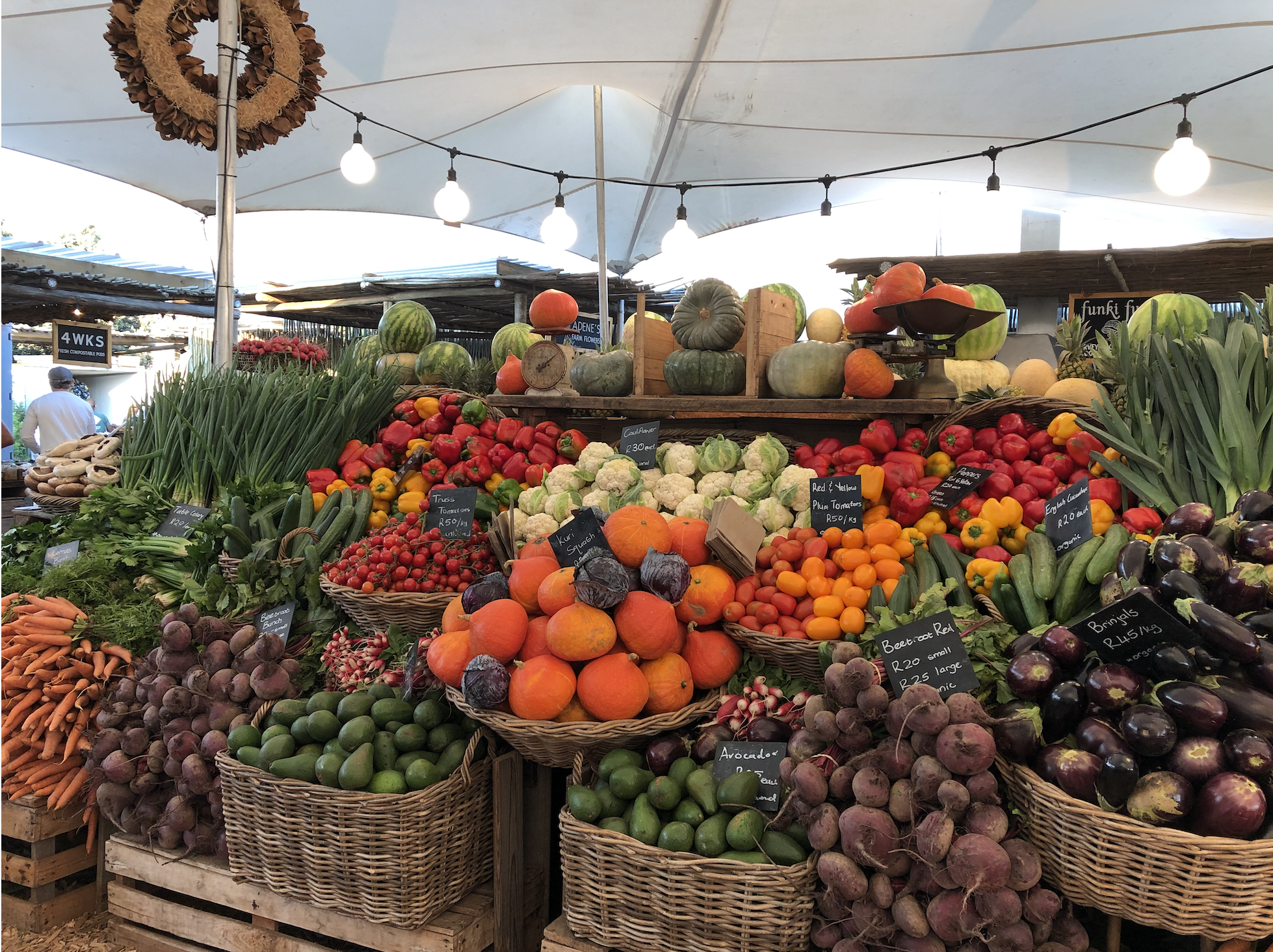
Vegetables at OZCF Market. Well, they were. Photo: Supplied
“We were just waiting for the President’s speech, but we knew on Saturday night (March 14) that we were going to have to close the market,” says Sheryl Ozinsky of the popular Oranjezicht City Farm Market (OZCF) which normally operates at the V&A Waterfront every Saturday, Sunday and, in summer months, Wednesday night. Ozinsky not only had to make the call to cancel the market after last Sunday (March 15), but that same day had to evacuate her home during the Table Mountain fire as well as postpone a wedding for 300 that was supposed to take place at the market this week.
The OZCF Market has 25 employees, buys from 35 farmers around the Western Cape and has 80 traders and producers… with all of their employees, that’s more than 300 people relying on the market for income. But the responsibility Ozinsky feels is even greater than that: “We still have vegetables available – they are literally in the ground waiting to be picked — and we need to encourage people in our community to eat healthy food and be strong during this terrible time we’re going through.”
Reacting at high speed, Ozinsky and her team came up with an alternative business model, which will launch on Tuesday (March 24), of online orders to be collected at the market.
“We are building it on the simplest of platforms,” says Ozinsky. On Fridays, farmers will deliver to the market, which has permanent refrigeration space. Everything will be cleaned and sterilised, and the farmers will maintain a safe distance from OZCF staff, she explains. The staff will refrigerate the produce and early Saturday morning, will start packing boxes and bags. Each customer who has ordered online will have received an order number and designated time to drive through the boom at the Granger Bay parking garage. They won’t get out of their car. One team member will wave to them and place their order in their boot. “That’s how we’re going to cope,” she says, adding that she’s not even sure she’s got the costing right, but it’s just so important to get it up and going.
There will be various boxes available, from seasonal veg boxes for two and four people to a salad box, power pack with garlic, ginger and chilli, and a fruit and nut box. Ozinsky hopes to add items from as many as their traders as possible, some of which have no other source of income beyond the market: products like meat, fish, bread, olives and cheese. Email [email protected] for information about ordering.
One of the OZCF Market’s traders is Maria van Zyl, whose small business Cream of the Crop Butter produces high quality cultured butter, ghee, pure buttermilk and vegan butter.
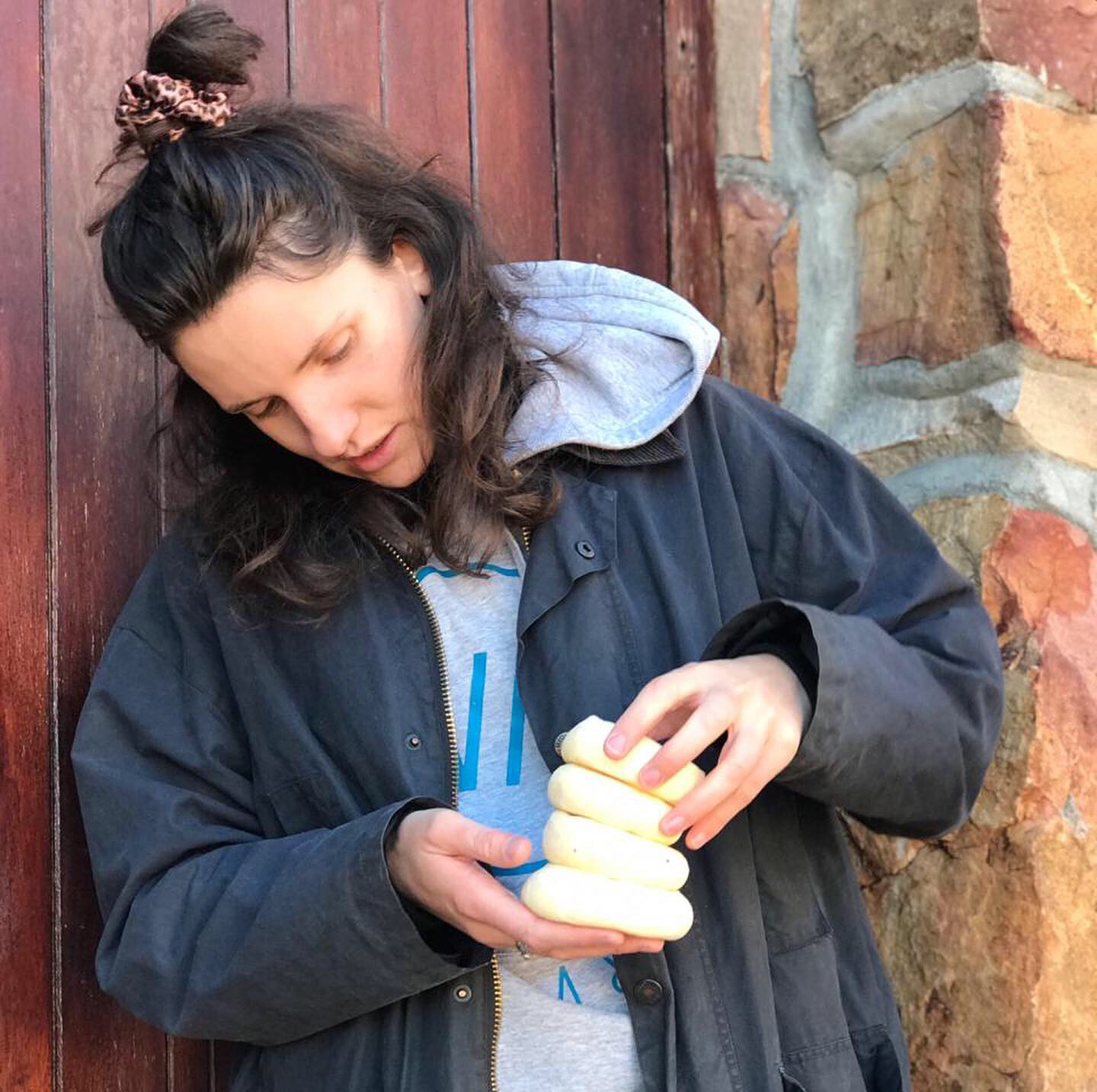
For Maria van Zyl Cream of the Crop Cultured Butter, Oranjezicht City Farm Market was her main outlet. Photo: Supplied
“The market was the major platform where I was selling butter,” says Van Zyl, who also supplies specialty shops like Olive Branch Deli in Cape Town and Sans in Sea Point. Now she’s hustling extra hard, having taken to Instagram to find her clients and let them know she’ll deliver, even if it’s one block of butter. Find Cream of the Crop on Instagram @mariavzyl. Orders for cultured butter and ghee can be emailed to [email protected] and for vegan butter to [email protected].
Consider the Farmers
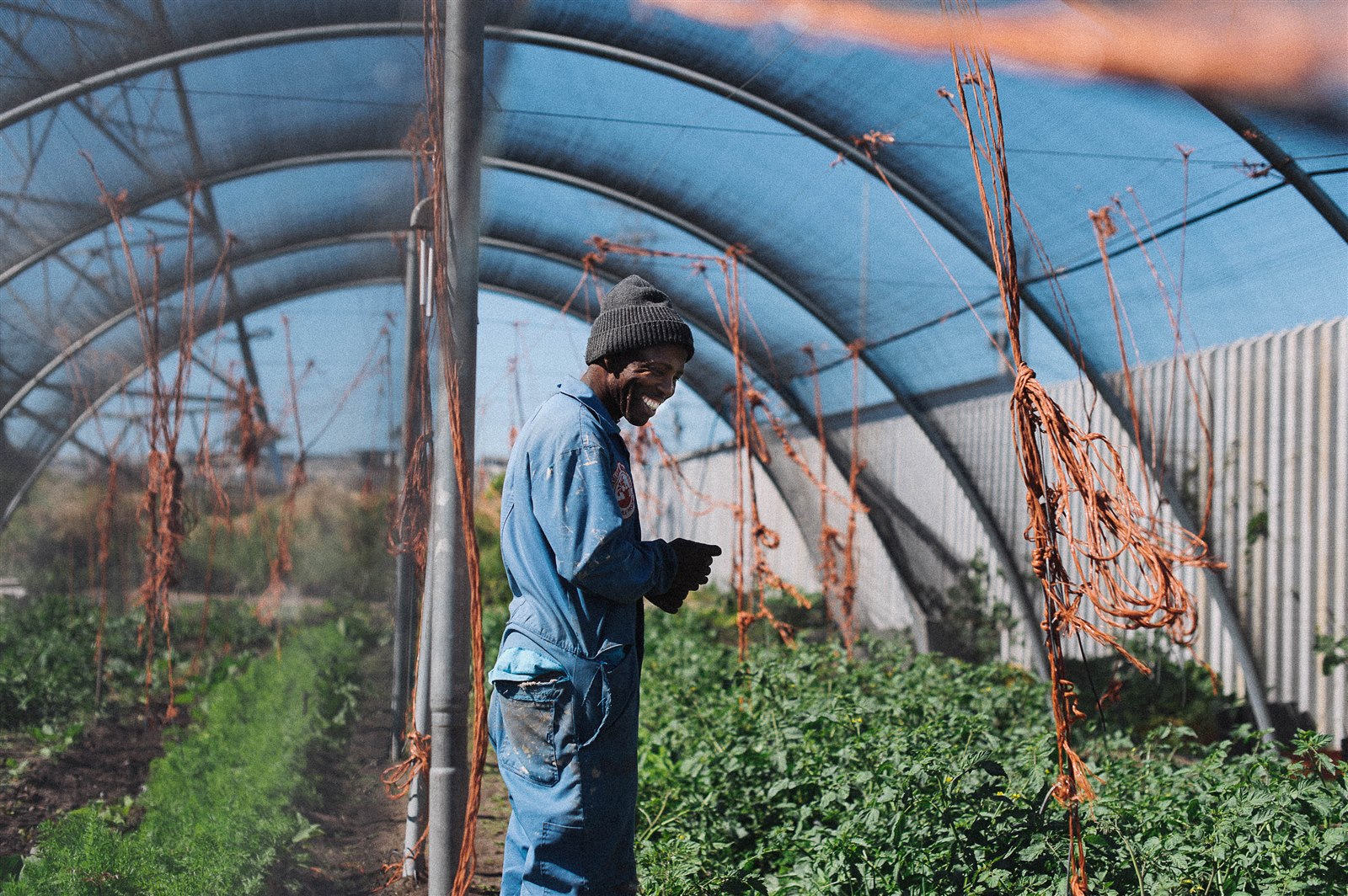
What of those who grow vegetables for the market, such as the Umthunzi Farming Community? Pictured is Manelisi Mapukata. Photo: Supplied
The shutdown of restaurants and caterers is also a huge blow to industry suppliers. Umthunzi Farming Community is a social business working in the field of sustainable urban food systems that works with about 50 small scale organic farmers from the Cape Flats. Normally, the produce is collected from the farmers, brought to the Umthunzi warehouse in Salt River and repacked and distributed to mostly wholesale customers and, in lesser quantity, consumers who purchase harvest bags.
“We’ve had to react really quickly,” explains Kim Bloch of Umthunzi, who this week lost business from shuttered restaurants like Clarke’s, Arthurs Mini and The Athletic, and one of its biggest customers, large buyer Pure Good, a catering company that provides thousands of healthy meals to corporate clients.
Yet as restaurants were closing, the delivery scene has been blowing up, and Bloch is rallied by both the surge of interest in home delivery and the interest consumers are expressing in supporting small growers and producers. “Buyfresh, a new online client of ours that does home deliveries of high quality, locally sourced produce, has seen a dramatic increase of order requests and sales,” she says.
“People are starting to panic as if it’s the Apocalypse and are anxiously purchasing vegetables as they self-isolate and as businesses are shutting down. They are wanting to find alternative ways to access foods that are healthy. We also feel a responsibility to continue supporting the farming network, particularly as our farmers have family members who are elderly and immune-compromised and at high risk for the virus.
“We decided to pivot really quickly,” explains Bloch, whose business, like the OZCF Market, has completely changed the way it operates within a week, reducing delivery days and staff. Most of the packers were sent home and will still receive their regular stipend through a youth employment services programme; the remaining three, who wanted to stay, are still working and self-isolating when not at Umthunzi.
“Normally we do a very interactive stock intake at the farms,” says Bloch. “Now it’s just grabbing bags and going.” In two days, the team packed an incredible number of harvest bags, as orders continued to rise. Wednesday’s order was the biggest they’ve ever had. Umthunzi has also added products to their offering from other small businesses: their customer Puregood (pre-cooked meals) and Theonista (kombucha).
“Meghan [Theonista] has 10 families she’s trying to keep afloat and Puregood has over 35 employees.” In addition, Theonista and another neighbour, gin producer Hope on Hopkins, have opened up their cold storage to Umthunzi during this period. “It gives me hope for us pulling through,” says Bloch.
The response has been incredible, with orders coming from Umthunzi’s Instagram page, word of mouth. “There is a massive drive to support local and low-income people who are marginalised,” says Bloch. It’s been the most amazing thing… I’m actually speechless.” For orders, go to Umthunzi.
Others in the food community are also bringing ideas from seed to harvest in the very short season imposed by Covid-19. Farmer Iming Lin of Meuse Farm, a speciality produce and herb supplier based in Hout Bay who supplies restaurants that have temporarily closed their doors, is spearheading a project called Food Flow that will redirect produce from various farms to needy families with children temporarily out of school, who normally rely on school feeding programmes.
“It happened Monday night,” says Lin. “I texted a bunch of people,” and things began to take shape. The resulting online platform, which Lin has been working on with youth development programme specialist Ashley Newell, will allow people to support by purchasing harvest bags which will be delivered to these communities; an extension of this will be an entry into a draw for a meal at one of Cape Town’s top restaurants.
“This is also a story of let’s support the restaurants in a tough time, so we will encourage winners to bring a couple of extra friends,” explains Lin.
Oxfam South Africa will administer the funds. The Department of Social Development and Disaster Relief, in order to integrate into their interim food distribution programme, will assist. Initially three farm amalgamators will be the main produce suppliers: Umthunzi Farming Community, Gracie Love in a Bowl and Phillipi Economic Development Initiative.
This is a time when anyone who is reading this should be doing whatever they can to support small food producers, farmers and restaurants. Everyone is hurting in these industries… but it’s the workers and their families who have the most to lose. DM



 Become an Insider
Become an Insider